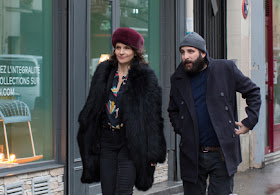Two stars. Rated R, for sexual candor, nudity and profanity
By Derrick Bang
The whimsical poster art implies that writer/director Olivier Assayas’ new film is some sort of bed-swapping romantic comedy.
Don’t be suckered.
While it’s true that most of these narcissistic characters are sleeping with each other, lovers of reading, bookstores and informed knowledge will be horrified. Non-Fiction isn’t the slightest bit amusing; Assayas’ script is a grim, cynical and thoroughly depressing harangue on the pending destruction of traditional publishing, at the hands of know-nothing Internet trolls whose notion of “cultural history” dates back roughly 15 minutes.
This dreary sentiment aside, the film is deadly dull: way beyond boring. This is an interminable talking-heads experience, with the five primary characters repeatedly arguing that things — in this case, art — needs to change in order to remain the same. Which is to say that the pervasive dumbing-down of the written word is necessary, if it’s to survive at all.
Lengthy conversations — whether between just two people, or six — are littered with arrogant judgments and sarcastic one-liners: Informed criticism is worthless in a world guided by 280-character tweets. All politicians are venal hypocrites interested in nothing but money and fame. Libraries are doomed, and therefore a waste of space. TV shows are meant to be binged, not savored. Fewer people read less every year. And my favorite: “People say art is corrupt, thus worthless, so it should be free.”
Mind you, some of these observations are undeniably true (which is even more depressing). But Assayas doesn’t have his characters argue these issues as a means of thought-provoking socio-economic debate; all this jibber-jabber is mere window-dressing — no more meaningful than the bullshit “discussions” held by half-drunk bar patrons — while these insufferably smug men and women try to make virtues of their moral failings.
The libidinous heart of this roundelay is Léonard Spiegel (Vincent Macaigne), a notorious author who delights in his scruffy bohemian mannerisms, and whose fame is built upon a series of cruel “auto-fiction” novels that are graphic, thinly disguised accounts of his own extra-marital flings. He cares not a jot that his previous lovers are humiliated after recognizing themselves in all but name, and are further embarrassed when such notoriety goes public.
Léonard is married to Valérie (Nora Hamzawi), a vaguely defined political consultant who — at first blush — seems coldly indifferent to her husband. But this is before we’ve gotten to know Léonard; it quickly becomes obvious that he doesn’t deserve her. Valérie is much too decent for him.
(Actually, we soon wonder how the whiny, sleazy Léonard ever could have had such an apparently voluminous string of lovers. The perks of being French, I guess.)
Léonard’s current extracurricular lover is Selena (Juliette Binoche), an actress who chafes at the creative limitations of starring in a violent and popular television crime show. “I don’t play a cop,” she keeps insisting. “I’m a crisis management expert.”
Selena is married to Alain (Guillaume Canet), chief editor at Vertheuil Editions, the small but modestly successful Parisian publishing house that has released all of Léonard’s books. Until now. The film opens as Alain gently — and somewhat patronizingly — surprises Léonard by refusing his just-completed manuscript, Full Stop.
We eventually wonder if this is an act of pique, because Alain has figured out that Léonard is sleeping with his wife. But later events render the issue moot, by which point we’ve also ceased to care either way.
At work, Alain reluctantly endures the advice of the younger, hipper Laure (Christa Théret), recently hired to bolster the imprint’s social media presence. Laure epitomizes all the worst aspects of so-called next-gen publishing; she suggests replacing physical books with e-books, believes that Twitter deserves to be termed literature, and insists that modern readers would too be fascinated by the collected tweets of anybody popular enough to have at least a million followers.
Needless to say, Alain is horrified by everything she says (as are we).
Naturally, he’s sleeping with her.
Alain is further stressed after learning that Vertheuil’s owner, Marc-Antoine Rouvel (Pascal Greggory) — mindful of ever-diminishing returns — thinks it might be time to sell out to a rapacious tech mogul.
Alain’s infidelity aside, Canet works reasonably hard to establish him as this saga’s “good guy.” Alain is pragmatic but unwilling to give up without a fight, and his objections to Laure’s contemptuous dismissal of traditional publishing certainly will resonate with like-minded book fans. We also grow to admire his “handling” of both Laure and Léonard; Canet gives Alain a warm sense of honor.
The bond that unites Alain and Selena feels equally persuasive, despite their respective flings. Canet and Binoche share a comfortable chemistry that bespeaks long-established familiarity.
But it’s impossible to like Laure; Théret makes her excruciatingly arrogant. Valérie remains a cipher; we can’t imagine why she’d put up with Léonard. Assayas’ script doesn’t give Hamzawi enough to work with, until the film’s final few scenes; only then does Valérie become something close to a real person.
The perils of marketing literature in the digital age certainly warrants discussion and debate, but these people make very poor advocates for either side. They’re unbearably self-righteous and condescending, and that’s particularly true of the sidebar supporting characters who pop up during dinner parties and afternoon wine gatherings.
It has been suggested that Assayas has chosen the publishing world as a proxy — much like Léonard’s “auto-fiction” — for the identical difficulties facing filmmakers at a time when far too many people are inexplicably content to watch movies on smart phone screens. That’s a reasonable assumption, but it’s also beside the point; his film simply isn’t interesting.
Asking viewers to spend 108 minutes with these mostly vain, faux intellectuals goes way beyond presumptuous.

No comments:
Post a Comment